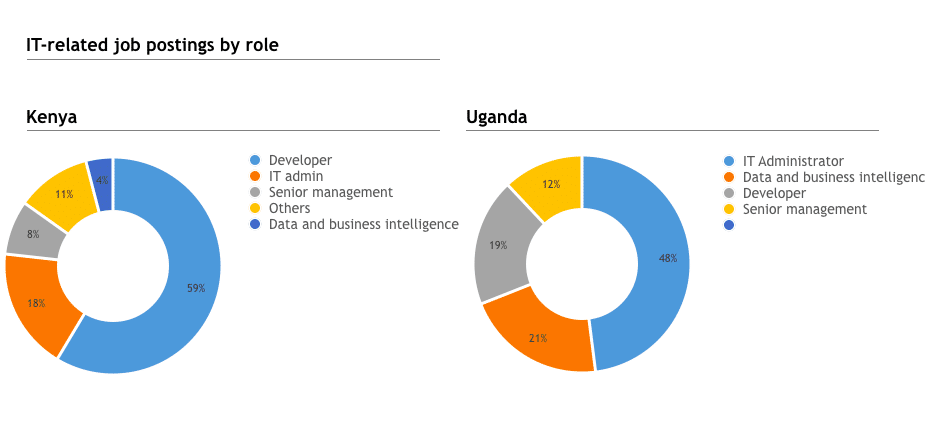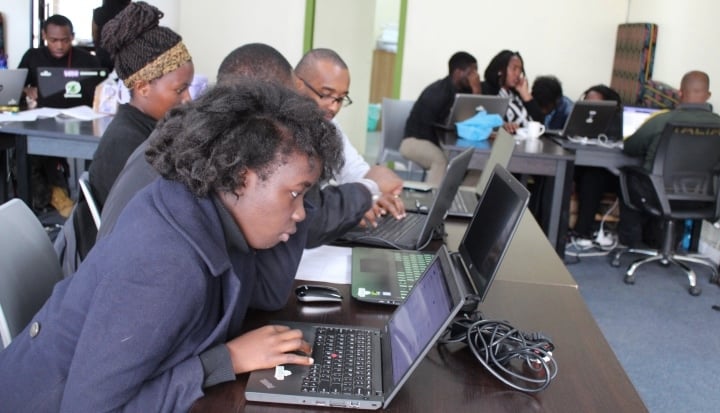After her second-hand clothing business failed, Faith struggled to find reliable work in Nairobi, where limited opportunities and a largely informal work market make it difficult for young Kenyans to find employment. A friend suggested she try Lynk, an online job-placement platform that pairs day labourers with businesses and households. Through its digital platform, Lynk placed Faith, 30, in an organic fertiliser plant, where she received training and now makes much more than she did when she ran her small kiosk in her neighbourhood.
In a country where nearly four out of five people work informally, Faith’s story helps illustrate how technology and innovation can drive Africa from the margins of the global economy into the mainstream.
Technology has the potential to address some of the region’s longstanding socio-economic problems, with a third of young people out of work. But unless educators and policymakers work with the private sector to train and skill people for some of the millions of advanced digital jobs that are needed, the region risks being left behind.
Mercy Corps’ new research into the skills gaps in Kenya and Uganda’s IT workforces identifies what talents are needed to drive these sectors forward. Based on over 80 in-depth interviews with employers, educators and IT professionals in Nairobi and Kampala, the findings show that the current shortage of IT professionals is set to increase, as universities fail to introduce curricula that reflect evolving needs.

The research revealed that 40 per cent of respondents working in IT describe themselves as self-taught. Informal programmes, online courses and tech hubs have stepped in to provide advanced IT skills training and are helping entrepreneurs develop products and businesses. Companies are also partnering with academic institutions to launch new programmes for workers already in the workforce – Safaricom, Kenya’s biggest mobile company recently partnered with Strathmore University and Moringa School to launch a data science programme to upskill its current employees.
The research also suggests insufficient private sector understanding about what IT entails, which may be surprising, given that Kenya is considered one of the most advanced innovation seedbeds in Africa. It points to an urgent need for private companies to work closely with learning institutions to grow a more adaptive and updated workforce across the industry, while ensuring that they stay abreast with the changing technologies and skill requirements among their employees.
In Uganda, Government policy lacks a strategy to support IT businesses and promote advanced IT skills, and current governmental restrictions on the digital economy are undermining the sector’s growth.
In that regard, it can look to Kenya, home to a $1 billion tech hub with more than 1,000 technology start-ups. Crucially, ‘Silicon Savannah’ has support from the government, which wants to turn Kenya into a global digital player and is investing in infrastructure like fibre-optic cables and the $10 billion Konza technopolis. Microsoft, Intel and IBM are expanding their presence, and Silicon Valley capital is fostering new ventures in Kenya and the wider region.
However, Kenya’s IT sector is expected to contribute just 1.37 percent to GDP by 2022, with the number of IT professionals growing from 56,000 to 95,000 people, which is too slow to keep pace with the global expansion of the industry. Consider artificial intelligence, which alone is expected to generate 2.3 million jobs worldwide by next year.
In Uganda, the IT industry is expected to grow 40 per cent to $1.1 billion over the next three years, as more investment in mobile broadband and related infrastructure is made. But that’s from a low baseline and the projection is it will account for just 2.8 percent of GDP in 2022.
The online recruiter that found Faith work and hundreds of other casual workers – from plumbers to nannies – is part of Mercy Corps’ Youth Impact Labs, supported by Google.org to back ventures that are using technology to tackle youth unemployment in East Africa and the Middle East.

Expanding information technology has benefits for other sectors in Kenya too, 90 per cent of adults own a mobile phone. MyDawa, a healthcare app, allows people to purchase medication online, addressing the challenge of counterfeit drugs that have saturated the Kenyan market. Digifarm, a mobile-based service enables smallholder farmers to procure inputs and access farming information through their phones.
The challenge now lies in galvanising the region’s emerging talent to build on these innovations. The move towards a digital economy will require a paradigm shift in training and skills development that not only recognises emerging technologies and trends, but the specific skills students require to thrive in the workplace. The findings in our research should encourage private sector to play a more integral role in innovating and driving new models of skilling upcoming and existing IT talent in the region to be competitive and keep pace with the fast moving changes globally.
For more information, you can contact the author Gituku Ngene at bn****@me********.org and follow him on Twitter at: @AfriSignature
The Competing in the Digital Age research was developed with Moringa School, a Youth Impact Labs participant. Moringa School puts secondary school graduates through a three-month coding boot camp, to gain the skills they need to giving place them in jobs at leading companies.










